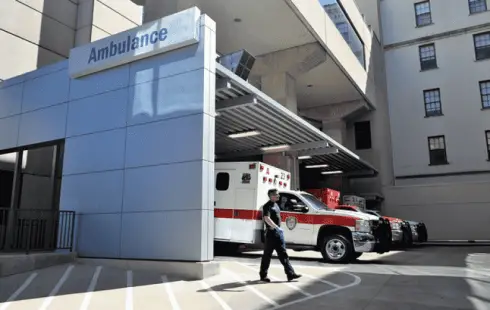
Poker Events That Dominate the International Gaming Scene
Section: Arts
 When there is a shortage of staff in the emergency rooms at Brandenburg's hospitals, they sign off every now and then. This was the result of a survey conducted by the German Press Agency. "Our central emergency room has never been closed, but logouts do happen," says Theresa Decker, spokeswoman for the Ernst von Bergmann Clinic in Potsdam. "A deregistration means signaling to the rescue service that other hospitals in regional proximity should be approached preferentially," she explains.
When there is a shortage of staff in the emergency rooms at Brandenburg's hospitals, they sign off every now and then. This was the result of a survey conducted by the German Press Agency. "Our central emergency room has never been closed, but logouts do happen," says Theresa Decker, spokeswoman for the Ernst von Bergmann Clinic in Potsdam. "A deregistration means signaling to the rescue service that other hospitals in regional proximity should be approached preferentially," she explains.
Logging out is like "pressing a pause button" and is always limited to a few hours. However, life-threatening illnesses such as strokes, heart attacks or even seriously injured accident victims would be admitted and cared for at any time. Before the corona pandemic, the Ernst von Bergmann Clinic treated around 43,000 patients in the emergency room every year. "The number is currently increasing and is back to the pre-corona level," said the spokeswoman.
In rare cases, the emergency rooms of the KMG clinics in Kyritz, Wittstock (both Ostprignitz-Ruppin), Pritzwalk (Prignitz) and Luckenwalde (Teltow-Fläming) also sign off on emergency services for a maximum of three hours. "This is a common procedure," emphasizes KMG spokesman Christian Meier. Via the Interdisciplinary Care Record (IVENA), the rescue services received real-time information about the available care capacities in the hospitals required for the injury or illness.
The emergency department at the Carl-Thiem Clinic Cottbus currently employs 32 nurses, 7 specialists and a chief physician, as reported by clinic spokeswoman Anne Holzschuh. "In times of pandemic, almost half of the staff is also sometimes absent and then it became scarce," she says. However, the emergency room has never had to close completely due to staff shortages.
According to Christian Meier, the main reasons for staff cancellations are short-term staff absences due to illness until a replacement arrives. However, the shortage of skilled workers is also making itself felt in the clinics. "The work density in a central emergency room is very high," Theresa Decker explains. For example, her hospital is observing a nationwide trend in which more and more employees prefer to work part-time or switch to other areas of the healthcare system.
Further absences due to vacation, illness or quarantine can usually only be compensated for by members of the company's own team against the background of necessary expertise, or attempts are made to counteract this by leasing staff.
In order to prevent these absences, the KMG clinics, for example, try to prevent staff turnover and at the same time be attractive to new employees. However, Christian Meier also sees politicians as having a responsibility here. Simplified recognition procedures for foreign professional qualifications, residence permits and international training cooperation would be the key words in his opinion.
To relieve the burden on its emergency department, the Ernst von Bergmann Clinic opened the "Emergency Practice", a joint acute and emergency care service, at the end of August 2022 in cooperation with the Brandenburg Association of Statutory Health Insurance Physicians. "Here, a medical on-call practice and a family doctor's practice are the central point of contact for emergency patients who present themselves independently at the clinic," explains Theresa Decker. People with minor illnesses in particular, which had previously accounted for half of all treatments in the emergency room, would be cared for there.
Image by F. Muhammad

Section: Arts

Section: News
Section: Arts

Section: Business

Section: Arts

Section: Arts

Section: Business

Section: Business

Section: Arts

Section: Health
Health Insurance in Germany is compulsory and sometimes complicated, not to mention expensive. As an expat, you are required to navigate this landscape within weeks of arriving, so check our FAQ on PKV. For our guide on resources and access to agents who can give you a competitive quote, try our PKV Cost comparison tool.
Germany is famous for its medical expertise and extensive number of hospitals and clinics. See this comprehensive directory of hospitals and clinics across the country, complete with links to their websites, addresses, contact info, and specializations/services.
Join us for an enchanting evening dedicated to the theme of love, featuring the vibrant sounds of flamenco, rumba, and romantic ballads. Ricardo Volkert & Ensemble will present 'Amor! Amor! Amor!', a celebration of love through passionate guitar melodies, virtuosic cello and bandoneon...



No comments yet. Be the first to comment!